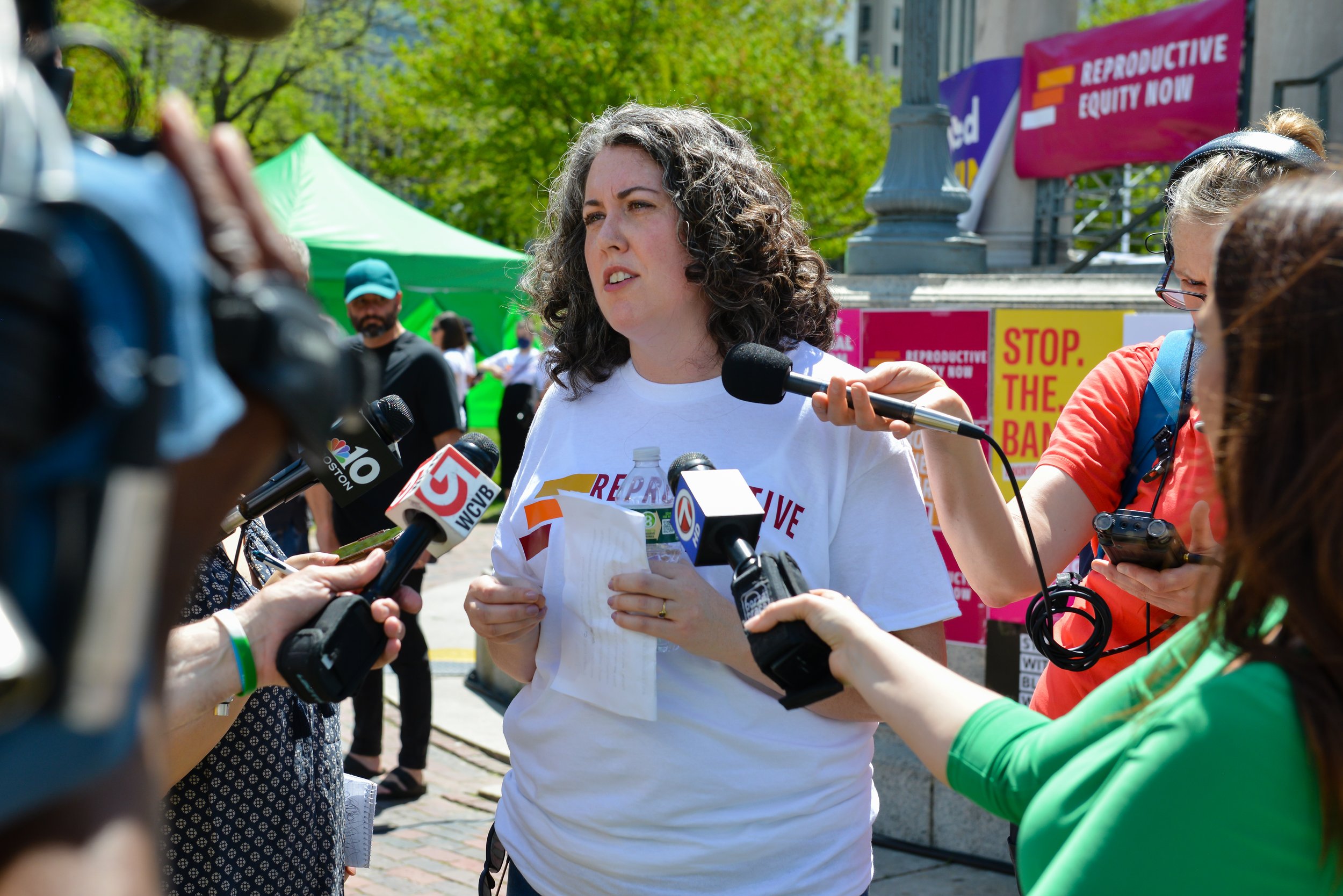
News & Updates
Media Inquiries
If you’re a member of the media and looking to speak with an expert at Reproductive Equity Now, contact our press team at press@reproequitynow.org!
If you have a general question or comment, please email info@reproequitynow.org.
Politico Playbook | Tomorrow marks one year since the Supreme Court overturned Roe v. Wade
And, on the heels of a new lawsuit accusing a so-called crisis pregnancy center in Worcester of deceptive advertising, Reproductive Equity Now is launching a public awareness campaign on abortion access. The group will hold organizing events in Gateway Cities, historically underserved communities and “abortion deserts” — areas of the state without clinics — starting in July.
WBUR | How the Dobbs abortion decision is playing out in Massachusetts, one year later
“What we’re worried about is that someone travels to Massachusetts for care and their cell phone is tracked,” said Rebecca Hart Holder, president of Reproductive Equity Now. The concern, she said, is that “an anti-choice actor in their state buys the data and uses it to prove that they had an abortion and tries to go after them for that abortion care.”
Boston Globe | Crisis pregnancy center accused of failing to care for Worcester woman who was later forced to have emergency abortion
Rebecca Hart Holder, president of Reproductive Equity Now, said the case should serve as a warning that centers like Clearway “not only harm the health and safety of people seeking abortion, but also patients in need of basic pregnancy care.”
Worcester Telegram & Gazette | Lawsuit alleges Worcester antiabortion clinic's missed diagnosis threatened woman's life
A lawsuit filed Thursday in Superior Court by abortion-rights advocates on behalf of an anonymous Worcester woman claims the actions of Clearway Clinic, a pregnancy clinic that advises patients against abortion, led to a missed diagnosis of an ectopic pregnancy that threatened the woman's life.
MassLive | Pharmacists may be able to prescribe hormonal birth control if this Mass. bill passes
Rebecca Hart Holder, president of Reproductive Equity Now, said women often face unnecessary clinical visits or examination requirements which prevents individuals from being able to get birth control, especially with a healthcare system which is backed up due to staffing shortages or from the aftermath of the pandemic.
Boston Globe | Here’s what’s in Healey’s proposed new sex ed framework
Such education frameworks can aid children in a country that has seen recent attacks on health care, said Taylor St. Germain, communications director at Reproductive Equity Now.
MassLive | Cell phone data privacy is the latest arena in abortion rights advocacy in Mass.
Reproductive advocacy groups including Reproductive Equity Now, the ACLU of Massachusetts, and Planned Parenthood Advocacy Fund of Massachusetts are working to support the “Location Shield Act,” also known as Bill H.357, that would ban the selling, leasing, trading or renting of cellphone location data.
WBZ | Civil Rights, Reproductive Care Coalition Supporting Location Data Bill
A coalition of organizations including the ACLU of Massachusetts, the Planned Parenthood Advocacy Fund of Massachusetts, and Reproductive Equity Now say that data brokers purchase movement and location data tracked by most cellphones and then resell it to anyone with a credit card. This includes anti-abortion groups and law enforcement agencies in states with bans on abortion services and gender-affirming care.
State House News Service | Abortion access advocates push for law protecting patient location data
A coalition of organizations including the Planned Parenthood Advocacy Fund of Massachusetts, Reproductive Equity Now and the ACLU of Massachusetts pointed to Vice reporting in May that found one location data firm allowed users to see roughly where Planned Parenthood abortion clinic visitors live.
Politico Playbook | Abortion providers harassed in Mass.
“We are absolutely concerned,” Rebecca Hart Holder, the president of Reproductive Equity Now, told Playbook. “No state is immune to extremists of all shapes and sizes, and so we have to be extremely vigilant in protecting providers.”
WWLP | REPORT: Out of pocket expenses for birth control significantly decreased in Massachusetts
Rebecca Hart Holder, President of Reproductive Equity Now telling 22News, “We know that getting co-pay free contraception not only lowers the rate of unintended pregnancy, but it also has really important side effects for gender equality. That includes increased participation in the workforce, better health outcomes in general, and lower rates of poverty.”
As Out-of-Pocket Costs Rise, Momentum Grows for Legislation to Eliminate Cost Sharing for Full Spectrum of Pregnancy Care
Yesterday, the Joint Committee on Financial Services held a hearing on several health insurance bills, including An Act Ensuring Access to Full Spectrum Pregnancy Care. Massachusetts residents testified to share their experiences navigating these exorbitant—and often unexpected—costs and what full spectrum pregnancy care would mean to them.
MassLive | Here’s how your Mass. state legislators would like to improve your health care
Representatives from Reproductive Equity Now and the League of Women Voters were among some of the groups to back the proposals, as did Kathryn Adamek, who paid $3,000 to give birth to her baby in 2020.
GBH | Abortion supporters cautiously celebrate Supreme Court preserving access to abortion pill
“[This] decision from the Supreme Court to uphold the stay on mifepristone allows us to breathe a temporary sigh of relief. As this case goes through the appeals process, millions of people will be able to continue to access mifepristone in states where abortion remains legal,” Rebecca Hart Holder, president of Reproductive Equity Now, said in an emailed statement. “However, we need to be clear-eyed that this is not the end of our battle to protect medication abortion access nationwide. ... Every day that preserves abortion access is a good day, but the fight continues.”
Boston Globe | The cold comfort of a reprieve
“We should not pretend that ultimately the courts will vindicate our rights,” said Rebecca Hart Holder, head of Reproductive Equity Now. “The Texas case shows what anti-abortion advocates are trying to do is ban abortion in all 50 states, and they will not stop until they achieve that goal.”
Boston Globe | Supreme Court blocks enactment of abortion pill restrictions
Still, some had a sense of trepidation as the larger case moves on. Rebecca Hart Holder, president of Reproductive Equity Now, a Massachusetts-based advocacy group, said it is impossible to read the tea leaves, given the court’s existing decision to overturn Roe vs. Wade and antiabortion groups’ attempts at a national ban on the procedure.
Elle Magazine | Access to Mifepristone Is in Danger. In Massachusetts, Maura Healey Stockpiled a Year’s Supply.
We asked ourselves what we could do as a state to protect people’s reproductive freedom here in Massachusetts. We were ready with a plan of action when the ruling came down on a Friday evening of a holiday weekend.
State House News Service | Healey Order Aims To Protect Abortion Pill Access
"With this stockpiled supply of mifepristone, our providers can continue to offer the gold standard of medication abortion care to thousands of people throughout the state, regardless of what a judge in Texas says," said Reproductive Equity Now President Rebecca Hart Holder. "Today, Massachusetts is sending a clear message that we will fight back against attempts to reach across our borders and restrict access to care."
NBC10 | Healey Orders Stockpiling of Abortion Pill in Mass., Clarifies Law Protecting it
The doses of mifepristone purchased by UMass Amherst are enough "to ensure sufficient coverage in the state for more than one year," according to a statement from Reproductive Equity Now.
MassLive | Medication abortion ruling: Gov. Healey unveils plan to protect mifepristone in Mass.
Rebecca Hart Holder, executive director of Boston-based Reproductive Equity Now, said Kacsymryk’s ruling “has no basis in science, medicine, or justice.”

